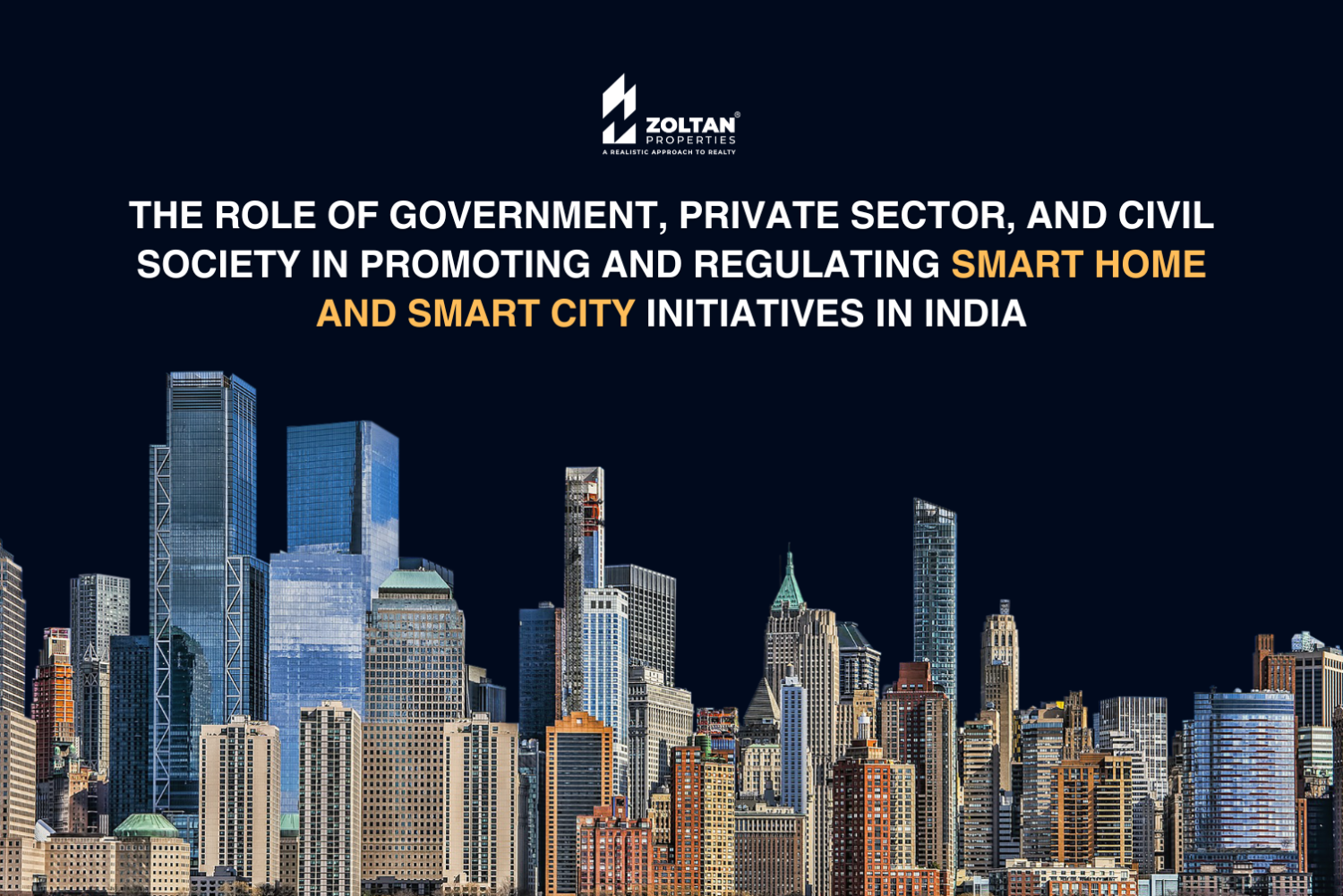Creating a conducive ecosystem for smart homes and smart city initiatives requires a collaborative effort involving the government, private sector, and civil society. This section delves into the roles and responsibilities of each stakeholder, highlighting the importance of policy frameworks, public-private partnerships, and community engagement in promoting innovation, ensuring regulatory compliance, and fostering sustainable development.
The promotion and regulation of smart home and smart city initiatives in India require the collective efforts of the government, private sector, and civil society. Here is an overview of their roles in driving the development and governance of these initiatives:
Government
Policy and Regulation
The government plays a crucial role in setting policies, regulations, and standards for smart home and smart city projects. It establishes frameworks that govern data privacy, cybersecurity, interoperability, and sustainability. Clear guidelines ensure the ethical and responsible deployment of smart technologies while safeguarding the interests of citizens.
Funding and Incentives
The government provides financial support, grants, and incentives to encourage the adoption of smart technologies. This includes funding research and development, offering tax benefits, and facilitating public-private partnerships. Such initiatives promote innovation, investment, and the scalability of smart home and smart city projects.
Infrastructure Development
The government is responsible for building the necessary physical and digital infrastructure to support smart home and smart city initiatives. This includes expanding broadband connectivity, developing IoT networks, and investing in sustainable energy infrastructure. Collaboration with other stakeholders ensures the deployment of reliable and efficient systems.
Private Sector
Innovation and Technology Deployment
The private sector, including technology companies, startups, and service providers, drives innovation and the development of smart home and smart city solutions. They design and deploy technologies such as IoT devices, data analytics platforms, and energy management systems. Private sector involvement accelerates the implementation of these initiatives by leveraging their expertise and resources.
Public-Private Partnerships
Collaborations between the private sector and the government foster the successful implementation of smart home and smart city projects. Public-private partnerships bring together the strengths of both sectors, combining technological expertise, financial resources, and public service delivery capabilities. These partnerships enable efficient project execution and ensure alignment with the needs of citizens.
Investment and Financing
The private sector plays a critical role in financing smart home and smart city projects. Companies invest in research, development, and deployment of technologies, and also provide funding for infrastructure development. They explore business models, such as build-operate-transfer (BOT) and public-private participation (PPP), to ensure the sustainability and profitability of these initiatives.
Civil Society
Advocacy and Awareness
Civil society organizations, NGOs, and community groups play a crucial role in raising awareness about the benefits and implications of smart homes and smart city initiatives. They advocate for inclusive and participatory approaches, ensuring that the interests and concerns of citizens are represented in decision-making processes.
Citizen Engagement
Civil society promotes citizen engagement and participation in the planning, implementation, and monitoring of smart home and smart city projects. They facilitate public consultations, gather feedback, and ensure that the projects align with the needs and aspirations of the community. Their involvement contributes to accountable and citizen-centric governance.
Monitoring and Accountability
Civil society organizations monitor the implementation of smart home and smart city projects to ensure transparency, accountability, and ethical practices. They act as watchdogs, scrutinizing the impact on privacy, data security, and social equity. Through advocacy and monitoring, civil society fosters responsible and sustainable development.
Collaboration and coordination among the government, private sector, and civil society are essential for promoting and regulating smart home and smart city initiatives in India. By leveraging their respective strengths, these stakeholders can create a conducive environment for the successful deployment of technology-driven solutions that benefit citizens and contribute to sustainable development.
In conclusion, the collaborative efforts of the government, private sector, and civil society are essential for the successful promotion and regulation of smart home and smart city initiatives in India. By working together, these stakeholders can harness the potential of these technologies to create more efficient, sustainable, and inclusive living environments for the citizens of India. With a shared commitment to innovation, privacy, and social welfare, India can emerge as a leader in the realm of smart technologies, improving the quality of life for its residents and paving the way for a smarter and more connected future.

 IN
IN
 France
France
 Germany
Germany
 Greece
Greece
 India
India
 Saudi Arabia
Saudi Arabia
 Spain
Spain
 United Arab Emirates
United Arab Emirates
 United Kingdom
United Kingdom
 United States
United States






